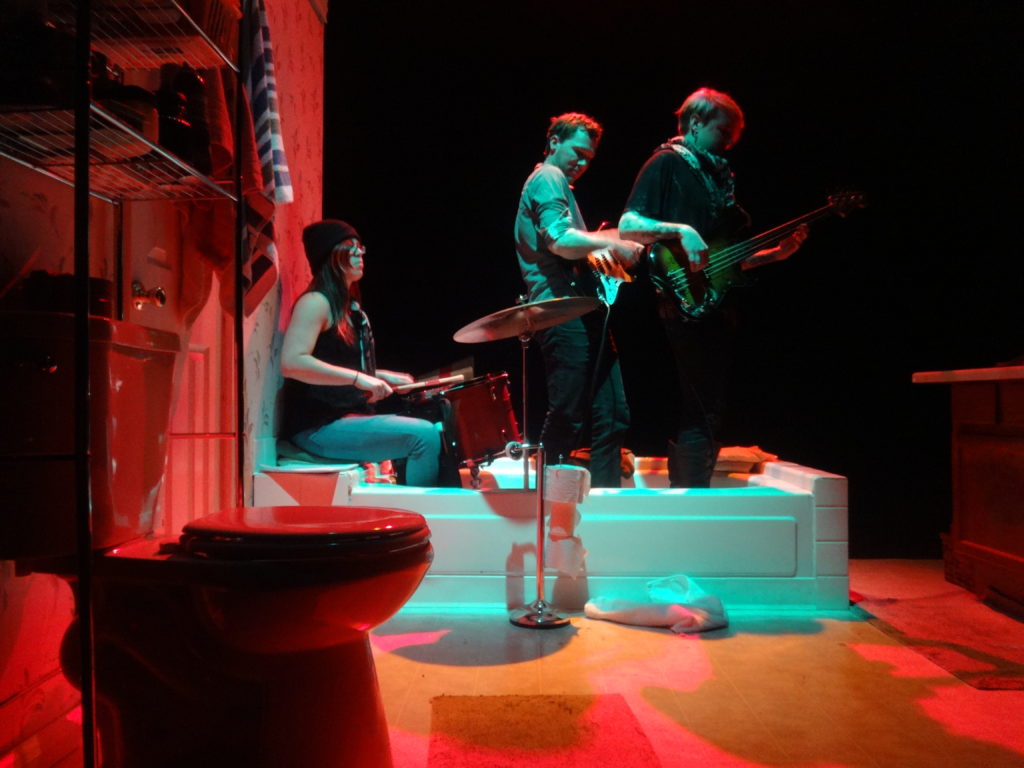reflects on bodies, love, loss and humanity
“10 Myths” is an oddly satisfying dark comedy, a meditation on bodies, humanity, love and loss.
This is an impressionistic story of corporeal selves, identity and flossing. Even if you are not in need of a makeup tutorial, there are life lessons to be learned. The bathroom mirror, truth-teller and judge of time and gravity, is the centerpiece and a key character. As the set is constructed, the back of the (imaginary) looking glass is to the audience; we become the mirror. We observe as a disparate cluster of characters pile into the bathroom, peer straight ahead and pluck, brush, fluff, tweeze and otherwise attend to their physical selves. It’s crowded, this bathroom, with six actors sharing space, not to mention a three-member band, already playing as the show begins. In the bathtub.
Consider the deeper meaning of morning ablutions: the judgments, the changing selves that peer back, the gender expectations and physical relationships that are apparent there, not to mention a chin hair or smudged mascara, in a tight space dedicated to all manner of bodily functions.
The porcelain throne is just part of the altar to the impermanent human vessel.
Part of the genius of “10 Myths” is the spare set. The play takes place in the small, minimally designed john at center stage, flanked by large black spaces: a video recorder on a tripod on one side, where a slow-motion disrobing takes place repeatedly, and a TV monitor on the other, where slow-moving housemates pick at casseroles and watch the video. Expensive set design wouldn’t tell the story any better.
The videos capture the nightly undressing of Sam (Diana Dresser), a process which she has obsessively labeled and archived for posterity. Sam is a short-timer, or may already have passed; the chronology is intentionally confusing. But we do know that people bring casseroles to comfort those who’ve suffered a loss. Sam is soulfully merged with Herman, and as a he-she combo they practice being physically glommed onto each other as well, in intricately choreographed togetherness. Erik Edborg is riveting as Herman, a gender-bending, leotard-wearing gentle soul. Dresser is a sprite (a water nymph?), landing her comic one-liners. They both let melancholy seep through the humor.
Housemates Jenny (Hannah Duggan) and one-armed Jolene (Erin Rollman) are a witty, verbally adept couple considering having a baby, while Edward (Michael Morgan) is stuck cleaning and the Narrator (Brian Colonna) serves to reign in the sometimes wandering story. Morgan is elastic as the deeply neurotic Edward, physically compounding each line reading. Colonna provides a baseline, the most buttoned-down character despite his flamboyant scarf and eye makeup.
Don’t try to label any of them; these characters resist defining.
The show is an adaptation/rearrangement of local author Miriam Suzanne’s novel “Riding SideSaddle,” which was printed on 250 interchangeable index cards, meant to be shuffled as an “open source” text. It too is more Rorschach test than linear story.
Suzanne sprinkles Greek myth into the mix (notably Salmacis and Hermaphroditus, who merge as one being of two sexes), along with a theoretical “God of Hygiene,” further blurring categories.
The band, Teacup Gorilla, underscores emotions and lines; the effect is appropriately wry.
“We’re not talking about death here, we’re talking about bodies,” Sam says. As the mirror knows, you don’t get one without the other.
-Joanne Ostrow, March, 7, 2016 Denver Post
